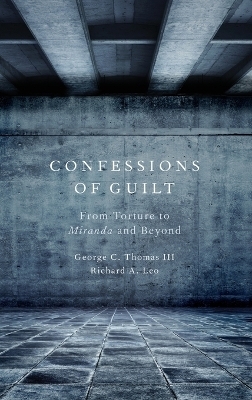
Confessions of Guilt
Oxford University Press Inc (Verlag)
978-0-19-533893-5 (ISBN)
How did the United States, a nation known for protecting the "right to remain silent " become notorious for condoning and using controversial tactics like water boarding and extraordinary rendition to extract information? What forces determine the laws that define acceptable interrogation techniques and how do they shift so quickly from one extreme to another?
In Confessions of Guilt, esteemed scholars George C. Thomas III and Richard A. Leo tell the story of how, over the centuries, the law of interrogation has moved from indifference about extreme force to concern over the slightest pressure, and back again. The history of interrogation in the Anglo-American world, they reveal, has been a swinging pendulum rather than a gradual continuum of violence.
Exploring a realist explanation of this pattern, Thomas and Leo demonstrate that the law of interrogation and the process of its enforcement are both inherently unstable and highly dependent on the perceived levels of threat felt by a society. Laws react to fear, they argue, and none more so than those that govern the treatment of suspected criminals.
From England of the late eighteenth century to America at the dawn of the twenty-first, Confessions of Guilt traces the disturbing yet fascinating history of interrogation practices, new and old, and the laws that govern them. Thomas and Leo expertly explain the social dynamics that underpin the continual transformation of interrogation law and practice and look critically forward to what their future might hold.
George C. Thomas III is Rutgers University Board of Governors Professor of Law & Judge Alexander P. Waugh, Sr. Distinguished Scholar. Richard A. Leo is Professor of Law and Dean's Circle Research Scholar at the University of San Francisco.
Chapter 1: Introduction ; Part One: The First Revolution in Interrogation Law: From Torture to Solicitude ; Chapter 2: Early Interrogation Law ; Chapter 3: English Interrogation Law from 1674-1848 ; Chapter 4: Early American Law of Interrogation ; Part Two: The Second Revolution in Interrogation Law: The Rational Approach Comes of Age ; Chapter 5: The Rise of Rationality in the Law of Interrogation ; Chapter 6: The <"American Methods>" - The Third Degree ; Part Three: The Third Revolution in Interrogation Law: Miranda's Volcano: Fiery, Brief, Dormant ; Chapter 7: The Miranda <"Revolution>" ; Chapter 8: Miranda Changes the Confessions World ; Chapter 9: Miranda Today ; Chapter 10: Interrogation Law: The Future?
| Erscheint lt. Verlag | 31.5.2012 |
|---|---|
| Verlagsort | New York |
| Sprache | englisch |
| Maße | 236 x 163 mm |
| Gewicht | 624 g |
| Themenwelt | Geschichte ► Teilgebiete der Geschichte ► Militärgeschichte |
| Recht / Steuern ► EU / Internationales Recht | |
| Recht / Steuern ► Rechtsgeschichte | |
| Recht / Steuern ► Strafrecht ► Kriminologie | |
| ISBN-10 | 0-19-533893-6 / 0195338936 |
| ISBN-13 | 978-0-19-533893-5 / 9780195338935 |
| Zustand | Neuware |
| Haben Sie eine Frage zum Produkt? |
aus dem Bereich


